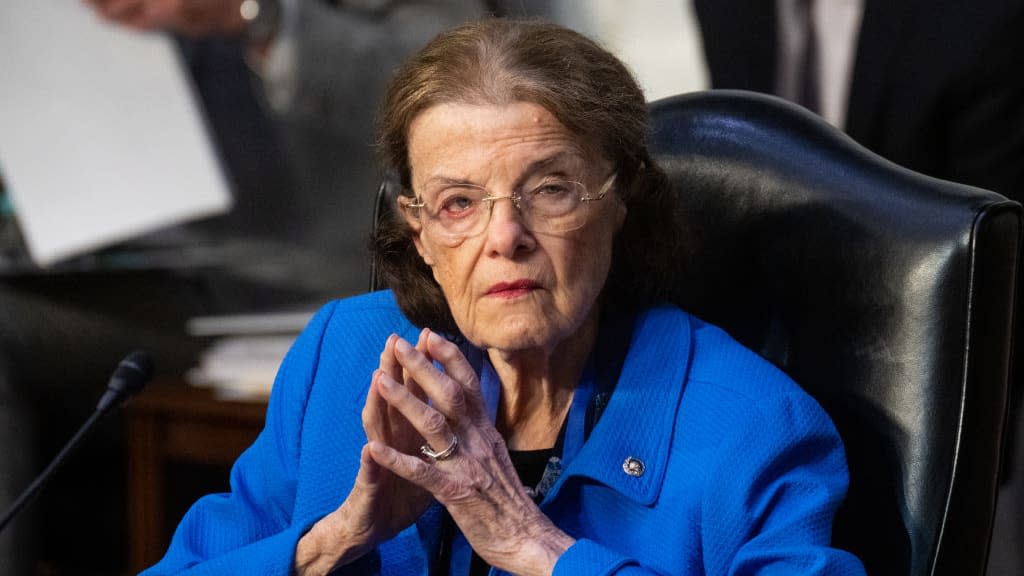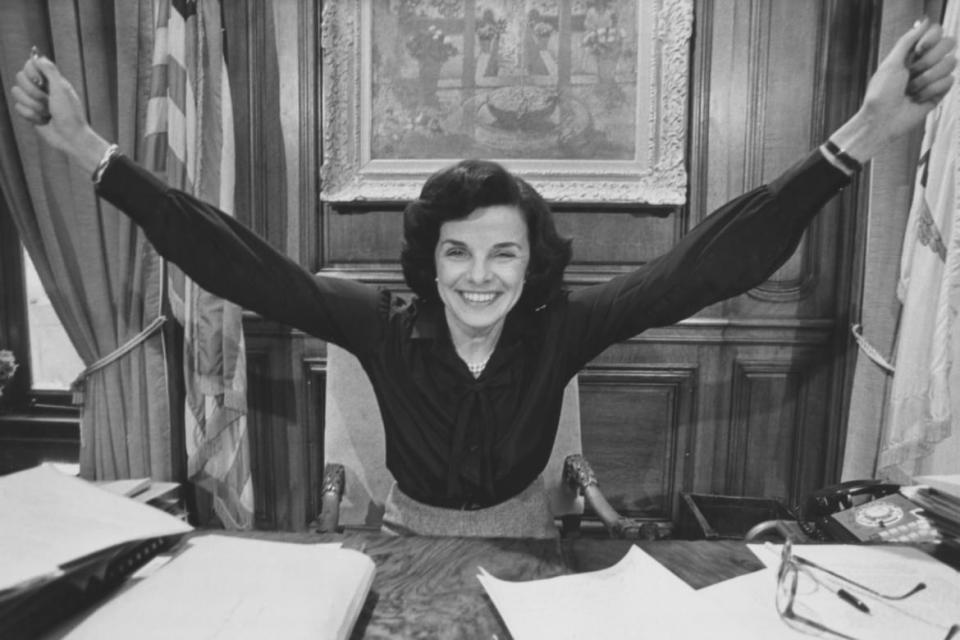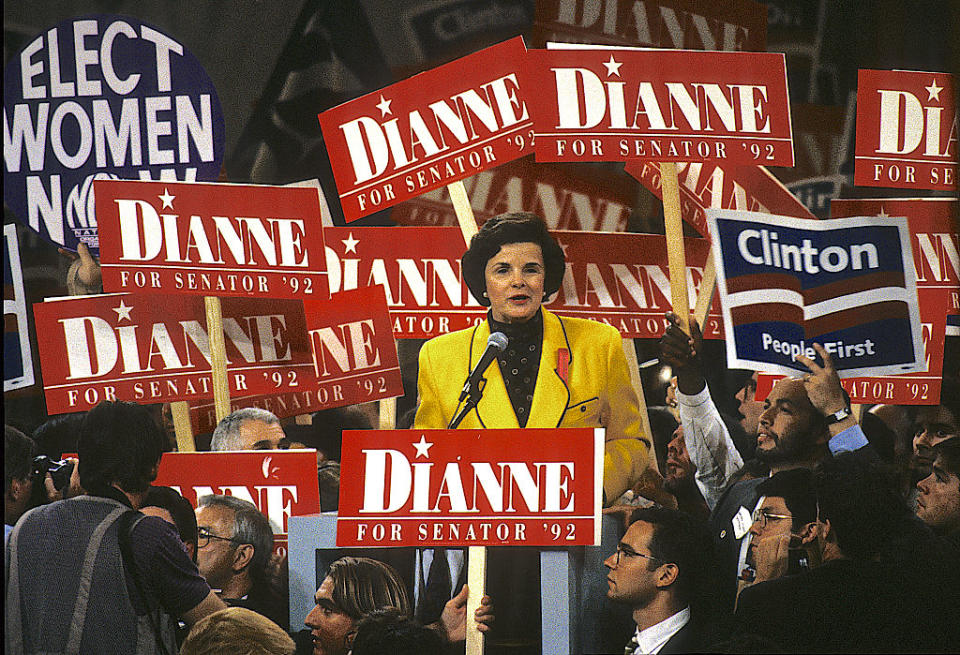Pioneering Senator Dianne Feinstein Dies Just Hours After Casting Final Vote

- Oops!Something went wrong.Please try again later.
- Oops!Something went wrong.Please try again later.
- Oops!Something went wrong.Please try again later.
Sen. Dianne Feinstein (D-CA)—the first woman elected to the U.S. Senate from California and the first female mayor of San Francisco—died on Thursday night at the age of 90.
Feinstein, who served in the Senate for over three decades, was the oldest sitting member of Congress and had suffered a bout of poor health during her final years in office. She nevertheless continued to serve, even voting on a spending bill on Thursday morning hours before her death. She missed two subsequent votes on Thursday afternoon.
In a statement released Friday morning, her chief of staff James Sauls confirmed the news.
“Sadly, Senator Feinstein passed away last night at her home in Washington, D.C.,” he said. “Her passing is a great loss for so many, from those who loved and cared for her to the people of California that she dedicated her life to serving.”
“There are few women who can be called senator, chairman, mayor, wife, mom and grandmother. Senator Feinstein was a force of nature who made an incredible impact on our country and her home state,” Sauls’ statement continued. “She left a legacy that is undeniable and extraordinary. There is much to say about who she was and what she did, but for now, we are going to grieve the passing of our beloved boss, mentor and friend.”
Dianne Feinstein Blazed a Path From City Hall to Senate
Throughout Friday morning, tributes poured in from Feinstein's longtime colleagues and allies.
“For decades, Senator Feinstein was a pillar of public service in California: from San Francisco’s City Hall to the United States Capitol,” House Speaker Emerita Nancy Pelosi (D-CA) said in a statement. “Her indomitable, indefatigable leadership made a magnificent difference for our national security and personal safety, the health of our people and our planet, and the strength of our Democracy.”
Senate Majority Leader Chuck Schumer also called Feinstein a “legend in California as the first woman senator. A legend in the Senate. She was the leader on so many different issues.”
Feinstein’s staff were only informed of the news at 9 a.m. on Friday, according to The New York Times. The longest-serving senator from California, Feinstein had planned to retire at the end of her term in 2024. Gov. Gavin Newsom will now be required to appoint a temporary successor to her Senate seat.

Feinstein celebrates in her office after she was elected mayor of San Francisco, circa 1978.
Her death will influence the trajectory of what was an already contentious race to succeed her in the Senate.
Three well-known California Democrats were already in the running: Reps. Adam Schiff, Katie Porter, and Barbara Lee. Each of them has spent most of the year aggressively campaigning and raising money. In this deep blue state, one of them is all but certain to ultimately win the seat in November 2024.
In the event Feinstein could not serve out her term, Newsom had been expected to appoint an interim caretaker—someone who would not seek election to the seat.
But Newsom’s vow to appoint a Black woman to the U.S. Senate—prompted by the departure of Vice President Kamala Harris—has complicated the politics of his decision-making.
Allies of Lee, a Black woman and the only competitive Black candidate in the race, have urged Newsom to make good on his pledge by appointing Lee to the seat if Feinstein could not finish her term.
Earlier in September, Newsom told NBC that he would still fulfill his vow, but said he would not alter the balance of the primary—meaning he would not appoint Lee. “I don't want to get involved in the primary,” he said.
In response, Lee slammed Newsom’s stance as “insulting to countless Black women.”

Feinstein, then mayor of San Francisco, addresses the Democratic National Convention. She would be elected to the Senate in November 1992.
A passionate campaigner on issues ranging from gun control to environmental protection, Feinstein will be remembered as a trailblazer for women in American political life. She first gained public office in 1969 after winning a seat on the San Francisco Board of Supervisors, later becoming the board’s first female president in 1978.
The same year, she became the acting mayor of San Francisco when Mayor George Mascone and Supervisor Harvey Milk were shot dead by Dan White, who had himself served as a supervisor. Feinstein found Milk’s body, and was the person who first told the media about the killings.
Following a failed bid for California governor in 1990, Feinstein won a special election to the U.S. Senate two years later, making her the first female senator in the state’s history. She campaigned alongside Barbara Boxer, who also won her Senate race, making California the first state to be represented in the Senate by two women.
Feinstein’s time in Congress was marked by several major legislative accomplishments, including writing the landmark Federal Assault Weapons Ban in 1994, which created a decade-long restriction on some semi-automatic weapons. She also sponsored environmental bills to protect huge tracts of California’s desert and played a key role in negotiations for the reauthorization of the Violence Against Women Act.
She also served as the first woman to chair the Senate Intelligence Committee and the Senate Rules Committee. During her tenure, the intelligence committee carried out a lengthy investigation into the CIA’s torture practices in the wake of the Sept. 11, 2001 terror attacks, ultimately leading to the release of a summary of the so-called “torture report” in 2014.
Throughout her final years, however, reports emerged that colleagues were concerned about her declining health, leading to questions about her ability to continue serving in the Senate. Her condition deteriorated further this year when she was hospitalized with shingles. The New York Times reported that the illness led to several other complications, including post-shingles encephalitis, though Feinstein released few details publicly.
Calls had grown in recent months—from Republicans and Democrats alike—for her to step down. She nevertheless continued to carry out her congressional duties, relying on the support of aides as she used a wheelchair while working on Capitol Hill.
Feinstein is survived by her daughter, Katherine, along with a granddaughter and three stepchildren.
Get the Daily Beast's biggest scoops and scandals delivered right to your inbox. Sign up now.
Stay informed and gain unlimited access to the Daily Beast's unmatched reporting. Subscribe now.

